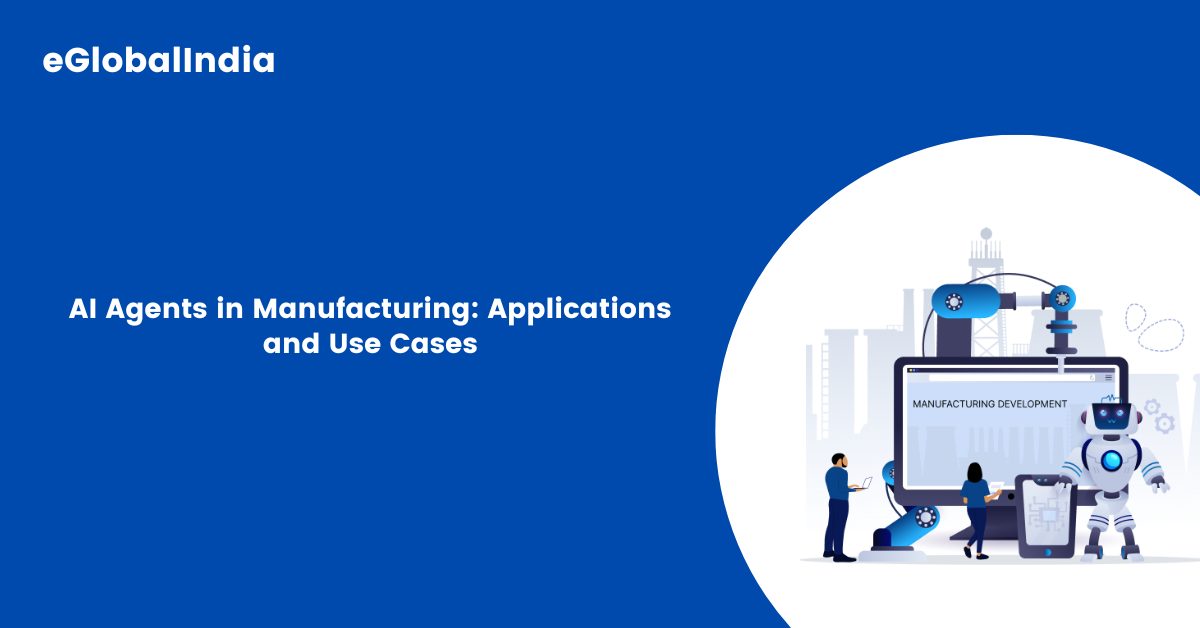

Manufacturing industries constantly face various challenges, such as optimizing production workflows, reducing downtime, maintaining high-quality standards, and managing costs efficiently. Traditional approaches often struggle to keep up with these demands, leading to inefficiencies, increased expenses, and missed opportunities for innovation. Artificial Intelligence (AI) has emerged as a game-changing solution, revolutionizing the way manufacturing processes operate.
With the rise of AI agents, manufacturing is undergoing a significant transformation. These AI-driven systems streamline decision-making, improve efficiency, and offer valuable insights using advanced data analytics and predictive modeling. AI agents can rapidly process large datasets, provide crucial insights, and enhance operational efficiency, making them an essential tool for modern manufacturing.
An AI agent, also called an intelligent agent, is a virtual assistant powered by artificial intelligence. It autonomously performs tasks by interpreting inputs, analyzing data, making informed decisions, and executing actions to achieve specific goals.
Key Features of AI Agents :
Core Functions of AI Agents :
These capabilities make AI agents invaluable in various industries, particularly in manufacturing, where efficiency and precision are crucial.
AI agents have become vital in the manufacturing industry, helping businesses automate processes, optimize resources, and improve decision-making. These agents analyze vast amounts of manufacturing data, enabling companies to make timely and informed decisions.
Capabilities of AI Agents in Manufacturing:
By integrating AI agents, manufacturers can significantly improve their efficiency, reduce downtime, and optimize production processes.
AI agents in manufacturing consist of several key components that enable them to function effectively:
These components enable AI agents to operate efficiently and contribute to improving manufacturing outcomes.
Applications and Use Cases of AI Agents in Manufacturing
AI agents analyze maintenance records and sensor data to predict equipment failures before they occur. This reduces downtime, lowers maintenance costs, and improves equipment reliability.
AI agents analyze inspection reports and identify defect patterns. They help manufacturers improve product quality and prevent future defects through continuous learning.
AI agents optimize production schedules based on market demand, order placements, and inventory levels. They analyze scenarios and determine the most cost-effective production strategies.
AI agents use real-time data to optimize supply chain networks. They predict demand, manage inventory, and optimize transportation routes, reducing costs and improving efficiency.
AI agents automate various language-based tasks, including analyzing manuals, generating reports, and assisting technicians in troubleshooting. This improves training efficiency and communication within teams.
AI agents monitor energy consumption in manufacturing facilities. By analyzing energy usage data, they optimize resource allocation, leading to cost savings and environmental benefits.
AI agents track inventory levels and predict future stock requirements. They help maintain optimal inventory, reducing waste and preventing shortages.
AI agents analyze market trends, geopolitical events, and weather patterns to identify potential risks in the supply chain. They provide recommendations to mitigate risks and ensure supply chain stability.
AI agents analyze customer feedback and market trends to assist in product design. They generate insights that help companies create innovative products aligned with customer preferences.
AI agents analyze market data to forecast future product demand. This helps manufacturers adjust production levels to avoid overproduction or underproduction.
AI agents analyze customer interactions and preferences to improve customer service. They provide personalized recommendations and enhance customer satisfaction.
AI agents optimize workforce scheduling by analyzing employee performance and training needs. They ensure the right personnel are assigned to tasks, increasing productivity.
AI agents continuously monitor manufacturing processes, detecting anomalies and deviations from standard procedures. This allows immediate corrective actions to maintain process stability and product quality.
AI agents analyze waste generation and recycling processes to identify strategies for reducing waste and improving sustainability.
AI agents assess supplier performance by analyzing contracts, reports, and audits. They provide insights that help manufacturers select reliable suppliers.
AI agents analyze market trends and competitor pricing to develop optimal pricing strategies. This ensures competitive pricing while maintaining profitability.
AI agents assist in training and research by providing analytics, simulations, and decision support. They improve product design and development processes.
AI agents predict and detect factory faults, helping manufacturers address issues before they cause significant disruptions. This improves production reliability.
AI agents enhance monitoring capabilities by analyzing factory floor data. This improves safety, decision support, and quality control.
AI agents in manufacturing are intelligent systems that automate decision-making, optimize processes, and enhance efficiency through machine learning, computer vision, and real-time data analysis.
AI agents optimize production by predicting equipment failures, automating quality control, streamlining supply chain management, and reducing downtime through predictive maintenance.
Yes, AI agents can significantly lower operational costs by minimizing waste, improving resource allocation, and automating repetitive tasks, leading to higher productivity and reduced human errors.
AI agents are used in predictive maintenance, robotic process automation, quality inspection, inventory management, and real-time production monitoring to improve efficiency and accuracy.
AI agents are not replacing human workers but augmenting their capabilities by handling repetitive, data-intensive tasks, allowing workers to focus on complex problem-solving and innovation.
AI agents are transforming manufacturing by automating processes, improving decision-making, and enhancing efficiency. From predictive maintenance and quality control to supply chain optimization and workforce management, AI plays a critical role in modern manufacturing.
By leveraging AI technology, manufacturers can achieve greater efficiency, reduce operational costs, and enhance innovation. As AI continues to evolve, its applications in manufacturing will only expand, helping businesses stay competitive in an increasingly digital world.
Upgrade to AI-Powered Manufacturing – Contact Us to Get Started!

© 2017 All rights reserved.